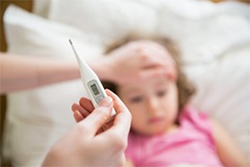Children Develop Long-term Immunity to COVID-19

Recent results of the ‘COVID-19 family Study Baden-Württemberg’ published as preprint / Asymptomatic course of infection in children five times more frequent than in adults / Immune response more stable than in adults
How does a COVID-19 infection work in children? Are they protected after an infection with mild symptoms? Which role do they play in the pandemic as sick people as well as sources and intensifiers of infection? Scientists of the university medical centers in Freiburg, Heidelberg, Tübingen and Ulm have examined these central questions in a study of COVID-19 in children, initiated and financed by the state of Baden-Württemberg.
They showed that children within the families were much less likely to be infected than adults, and that the symptoms were usually much milder. At the same time, the immune response in children was on average stronger and lasted longer than in adults, regardless of whether symptoms occurred. The results were published as a preprint in Juli, 2021.
Fewer symptoms, better immune protection
For the study, 328 families with at least one member suffering from COVID-19 were examined several times. A total of 548 children between the ages of 6 and 14, and 717 adults took part. In families with one infected person, children (34 percent) contracted the disease significantly less often than adults (58 percent) and - in the event of an infection - were five times more likely to be without symptoms (adults: 9 percent, children: 45 percent). Nevertheless, the children showed higher and longer-lasting specific antibody levels than adults eleven to twelve months after infection. This was the case regardless of whether there were signs of illness or not. The children's antibodies are very effective against various virus variants, so that children who are not visibly ill should also be protected after an infection. None of the infected children needed to be treated in hospital.
Different symptoms of illness
Adults and children also differed in the reported complaints. While fever, cough, diarrhea and taste disorders were equally good indicators of infection in adults, only taste disorders were a clear indicator of a COVID-19 infection in children (in 87 percent). A cough and fever were only indicative of an infection with increasing age from around the age of twelve.
In summary, it can be seen that children who have recovered from COVID-19 develop a very effective and sustained immune defense against new coronavirus infections despite an often very mild or even symptom-free course. There are indications that children's immune defenses even outperform those of adults.
Study title: Typically asymptomatic but with robust antibody formation: Children's unique humoral immune response to SARS-CoV-2
DOI: 10.1101 / 2021.07.20.21260863
Link to the study.
Back